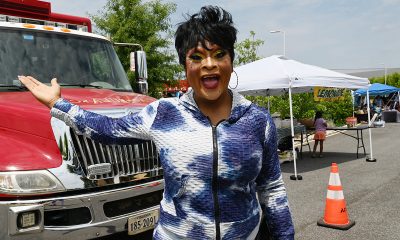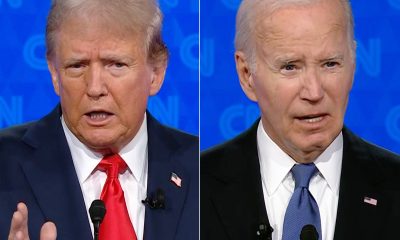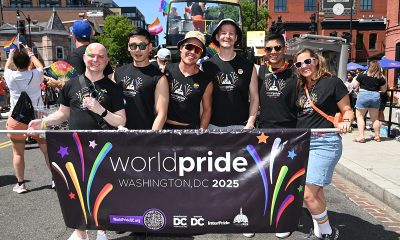News
Trump nominee refuses to say foreign laws criminalizing gays unjustified
Brownback nominated as U.S. ambassador for int’l religious freedom
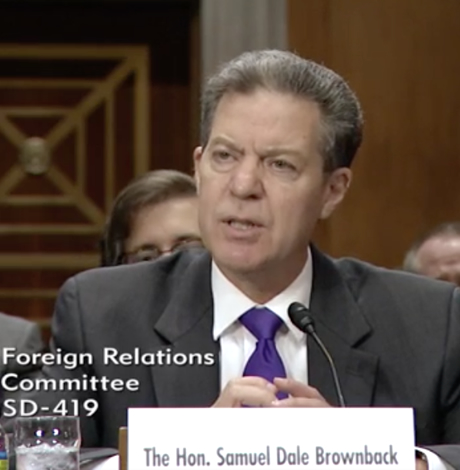
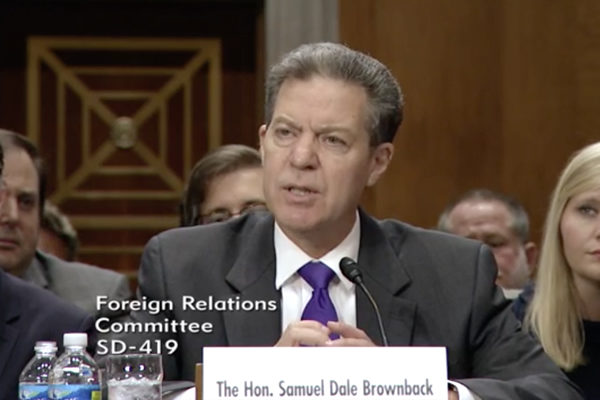
Gov. Sam Brownback (R-Kansas), nominated as U.S. ambassador for religious freedom, speaks before the Senate Foreign Relations Committee on Oct. 4, 2017. (Screen capture public domain)
President Trump’s pick as U.S. ambassador for international religious freedom faced tough questioning Wednesday over his anti-LGBT record during which he refused to say laws in foreign countries criminalizing LGBT status were always unjustified.
Kansas Gov. Sam Brownback, whom Trump nominated in July to become U.S. ambassador at-large for international religious freedom, was non-committal on opposition to these foreign laws, which in some cases penalize homosexuality with death, under questioning from Sen. Tim Kaine (D-Va.).
Seeking to connect the issue of anti-LGBT discrimination to religious freedom, Kaine asked Brownback if he’s aware that countries have laws punishing homosexuality with imprisonment or death.
When Brownback replied, “I believe that’s correct,” Kaine pointed out the justification for these draconian anti-gay laws is religious reasons.
In response, Brownback said the day before his confirmation hearing, he had a “lengthy conversation” with Randy Berry, who continues to serve during the Trump administration as U.S. envoy for the State Department for international LGBT human rights issues, and how he worked with the Obama administration’s U.S. ambassador for religious freedom David Saperstein.
“We had a good conversation about how these two offices work together,” Brownback said. “I don’t see doing anything any different than what they worked together.”
Kaine started to reply, “That wasn’t really my question,” but Brownback responded, “But that really is the point.”
Seeking to get back on topic, Kaine asked the nominee if there’s any situation in which religious freedom could be used to justify laws imprisoning or executing people for being LGBT, but Brownback didn’t directly answer.
“I agree with what Randy Berry did around the world on that topic,” Brownback said. “I’m not fully briefed on the various specifics of what he basically did and described to me yesterday and the work he did back and forth with ambassador Saperstein, I wouldn’t see changing.”
With his question unanswered, Kaine asked again if there’s any circumstance in which criminalizing homosexuality for religious reasons is justified, but Brownback again declined to directly answer.
“I don’t know what that would be and what circumstance, but I would continue the policies that had been done in the prior administration in work on these international issues,” he said.
Kaine wasn’t satisfied: “I really would expect an unequivocal answer on that, but my time is up.”
Brownback refused to say outright laws criminalizing homosexuality are always unjustified days after the Trump administration faced criticism for voting against a U.N. resolution condemning the death penalty for homosexuality. The Trump administration defended that action by saying the resolution was about the death penalty in general, not specific to gays, and previous administrations declined to support similar resolutions.
The choice of Brownback as ambassador for religious freedom overseas has inspired consternation among LGBT rights supporters since Trump announced his choice based on the Kansas governor’s anti-LGBT record, which was explored during the hearing.
Brownback also faced tough questions from Kaine about rescinding as governor an executive order barring anti-LGBT discrimination in the state workforce.
Referencing Brownback’s decision in 2015 to reverse the order established by his Democratic predecessor Kathleen Sebelius, Kaine asked the nominee to defend his actions.
“That was an order that created a right by the executive branch that wasn’t available to other people and it wasn’t passed by the legislative branch,” Brownback replied. “I believe those sorts of issues should be passed a legislative branch.”
But Kaine wouldn’t have Brownback’s explanation the protections should be left the legislature, asking the nominee, “Isn’t that kind of the point to an executive order?”
“You issue an executive order on something that the legislature doesn’t pass,” Kaine added. “If it was clearly in statute, you wouldn’t need to issue an executive order.”
But Brownback said an executive order against anti-LGBT discrimination would be inappropriate because it was “a foundational issue that you were creating a right for state employees that wasn’t available to the rest of the people in the state.”
When Kaine replied “was it bad” to give state employees a course of action under anti-LGBT discrimination, Brownback insisted the state legislature should be responsible for those protections.
Kaine asked Brownback a series of questions on whether as Kansas governor he appoints Cabinet secretaries and agency heads, and the nominee more or less affirmed that was the case. When Kaine asked Brownback if he applies a high standard to state employees, Brownback replied “yes.”
Kaine’s follow up: Why then, as Kansas governor, could he also not protect LGBT state employees through executive order?
“If you’re hiring for honesty, if you’re hiring for competence, wouldn’t that be an appropriate thing that the governor as a chief of state personnel operation would want to know about leaders in state government,” Kaine said.
Brownback’s defense: “I think that would be a rational thing. I just don’t think it’s a right the executive branch should create without the legislative branch.”
Reversing the executive order isn’t the only anti-LGBT action Brownback took as governor. Last year, he signed into law a “religious freedom” bill allowing student groups at taxpayer-funded public universities in Kansas to deny membership to LGBT students.
As a member of Congress — first as U.S. House member, then as U.S. senator — Brownback built a significant anti-LGBT reputation. Among other things, Brownback championed a U.S. constitutional amendment that would have banned same-sex marriage.
Kaine recalled during his tenure as Virginia governor issuing an executive order against anti-gay discrimination in state employment, saying that was the first action he took as governor even though he faced resistance from then-Virginia Attorney General Bob McDonnell over the legislature not having acted on the issue.
“Can’t you see that the retraction of an executive order like this that had been in place for eight years sends a message that that is not a value, non-discrimination against folks on the grounds of sexual orientation, that’s not a value that you share?”
Brownback disagreed and insisted for the role at hand as ambassador for religious freedom, he wouldn’t engage in any kind of discrimination.
“I look forward to working with people, working with everybody regardless of their ideas or views on how we can advance the agenda of religious freedom,” Brownback said.
Also questioning Brownback on LGBT rights was Sen. Jeanne Shaheen (D-N.H.), who after raising the issue of Indonesian refugees in her state facing deportation asked Brownback if he’s willing to work with civil society groups working not just on religious freedom, but LGBT and women’s rights.
In response, Brownback insisted his focus will be religious freedom to maintain bipartisan support for that role.
“I will work with anybody that I can on the topic of religious freedom and not veer out of that lane because I think if you start to veer out of that lane, you get pulled to other topics that other people are charged with doing, you’re going to lose bipartisan support for the position, which is critical to have,” Brownback said.
Coming to Brownback’s defense was Sen. Marco Rubio (R-Fla.), who was chairing the hearing and said his colleagues were asking him about topics other than religious freedom.
“If there is persecution on the basis of religion, or oppression on the basis of religion, or the denial of liberty on the basis of religion, your job would be to advocate for that freedom for them to practice in peace religion in peace,” Rubio said. “That is the scope of the job that you’d been nominated to, is that correct, not to litigation theological points or policy differences beyond the scope of that liberty?”
Brownback affirmed that view and repeated his response that bipartisan support for his role is important, adding a distraction into other issues would make the position “less effective if effective at all.”
David Stacy, the Human Rights Campaign’s director of government affairs, said after the hearing his organization remains “deeply concerned” about Brownback’s nomination.
“Brownback’s long history of anti-LGBTQ actions in Congress and as governor was reflected in his refusal at his hearing today to unequivocally condemn the inhumane treatment, including execution, of people based on sexual orientation and gender identity,” Stacy said. “While he expressed some support for the LGBTQ human rights work at the State Department, his other responses give us every reason to believe that Brownback will continue to use his own narrow view of ‘religious freedom’ as permission to discriminate against LGBTQ people.”
Politics
HRC slams White House over position opposing gender affirming surgeries for minors
‘Biden administration is flat wrong on this’
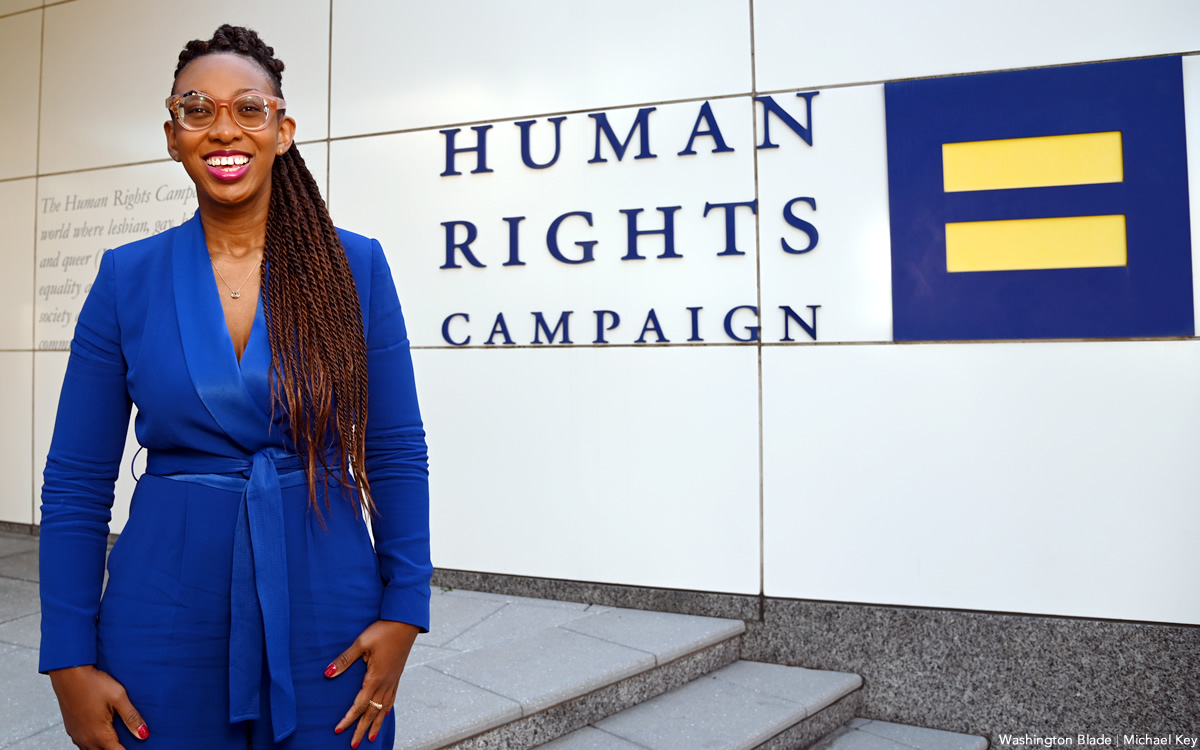
Human Rights Campaign President Kelley Robinson issued a strong rebuke on Tuesday of the Biden-Harris administration’s position opposing gender affirming surgeries for minors.
The New York Times reported on June 28 that the White House, which broadly supports making medical interventions available for transgender youth, had expressed opposition to surgeries for patients under 18, having previously declined to take a specific position on the question.
“Health care decisions for young people belong between a patient, their family, and their health care provider. Trans youth are no exception,” Robinson responded.
“The Biden administration is flat wrong on this. It’s wrong on the science and wrong on the substance. It’s also inconsistent with other steps the administration has taken to support transgender youth. The Biden administration, and every elected official, need to leave these decisions to families, doctors and patients—where they belong,” she added. “Although transgender young people make up an extremely small percentage of youth in this country, the care they receive is based on decades of clinical research and is backed by every major medical association in the U.S. representing over 1.3 million doctors.”
Robinson said the “administration has committed to fight any ban on healthcare for transgender youth and must continue this without hesitation—the entire community is watching.”
“No parent should ever be put in the position where they and their doctor agree on one course of action, supported by the overwhelming majority of medical experts, but the government forbids it,” she added.
HRC is a prominent backer of Biden’s 2024 reelection campaign, having pledged $15 million to support efforts in six battleground states. The organization has a strong relationship with the White House, with the president and first lady headlining last year’s National Dinner.
A White House spokesperson declined to respond to Robinson’s statement.
Campaign for Southern Equality President Allison Scott also issued a statement.
“This is a cowardly statement from an administration that promised to support transgender people. It is a troubling concession to the right-wing assault on transgender Americans, falling for their false narratives about surgical care and betraying a commitment to equality and trust in the medical community,” said Scott.
“Let’s be very, very clear: Government has no business inserting itself into private medical decisions that should be exclusively between patients, their providers, and the patients’ parent or guardian,” Scott added.
“It is dangerous to begin endorsing categorical bans or limits on healthcare, and there is no justification for restricting transgender youth’s access to the very same care that many cisgender youth receive every year — that’s literally the definition of discrimination,” Scott concluded. “We demand the Biden administration retract this thoughtless statement and work to undo its damage.”
Virginia
Parades, community events held to mark Pride Month in Va.
Upwards of 30,000 people attended PrideFest in Norfolk on June 22

Activists across Virginia last month held a series of events to mark Pride Month.
Hampton Roads Pride, a volunteer-run organization founded in 1997, held 37 different Pride events throughout the region in June.
Their biggest event, PrideFest, which is part of their larger three day event, Pride Weekend, celebrated its 36th anniversary on June 22. Pride Weekend took place from June 21-23 and began with a block party at NorVa in Norfolk.
PrideFest took place at Town Point Park, and an estimated 30,000 people attended. More than 70 venders participated, while Todrick Hall and Mariah Counts are among those who performed.
Another PrideFest event with a DJ in the afternoon and live music at night took place in Virginia Beach on June 23. Congressman Bobby Scott and U.S. Sen. Tim Kaine (D-Va.) are among those who attended Pride events in Suffolk on June 30.
Norfolk Mayor Kenneth Alexander, along with members of the Norfolk and Virginia Beach City Councils, also attended the Pride events in their respective cities. Jamar Walker, the first openly gay federal judge in Virginia, also took part.
“You know people all throughout Pride Month, at all of our various events, tell me all kinds of stories about their own experiences and the past of this community … and some of our older folks especially, remember when we couldn’t have this,” Hampton Roads Pride President Jeff Ryder told the Washington Blade on Monday during a telephone interview.
“It was a great year,” he added. “It was a big achievement for us to have unique celebrations in each of our seven communities. Each of these cities is so different from one another, but to be able to create a Pride celebration that’s unique in each of those places was really great, and I think really well received by folks who may not have felt represented previously. We’re always trying to do better, to embrace every aspect of our community, and take a big step forward there this year.”
State Dels. Adele McClure (D-Arlington County) and Alfonso Lopez (D-Arlington County) are among those who spoke at Arlington Pride that took place at Long Bridge Park on June 29. The Fredericksburg Pride march and festival took place the same day at Riverfront Park in Fredericksburg.
Republican Virginia Gov. Glenn Youngkin on June 10 hosted a Pride Month reception in Richmond.
Youngkin in previous years has hosted Pride Month receptions, even though Equality Virginia and other advocacy groups have criticized him for supporting anti-LGBTQ bills.
The Republican governor in March signed a bill that codified marriage equality in Virginia. Youngkin last month vetoed a measure that would have expanded the definition of bullying in the state.
U.S. Supreme Court
Concern over marriage equality in US grows two decades after first Mass. same-sex weddings
Gay and lesbian couples began to marry in Bay State in 2004

Two decades after Massachusetts became the first state to legalize same-sex marriage, a new study reveals both significant progress and ongoing challenges for married LGBTQ couples in the U.S., with a growing sense of insecurity about the future of their rights.
The Williams Institute at UCLA School of Law surveyed 484 married same-sex couples from all 50 states and D.C. The study, released Monday, marks the 20th anniversary of legal same-sex marriage in the U.S.
Researchers found that 93 percent of respondents cited love as a primary reason for marrying, with 75 percent also mentioning legal protections. Over 83 percent reported positive changes in their sense of security, and 74.6 percent noted improved life satisfaction since marrying.
However, the study also highlighted persistent discrimination and growing concerns about the future. About 11 percent of couples who had a wedding reported facing prejudice during the planning process.
Alarmingly, nearly 80 percent of respondents expressed concern about the potential overturning of the 2015 Obergefell v. Hodges decision, which legalized same-sex marriage nationwide. This anxiety has been exacerbated by initiatives like Project 2025, a conservative policy blueprint that some fear could roll back LGBTQ rights if implemented.
The possibility of a former President Donald Trump victory in the upcoming election has further intensified these concerns. Many respondents cited Trump’s previous U.S. Supreme Court appointments and his statements on LGBTQ issues as reasons for their apprehension. One participant stated, “The thought of another Trump presidency keeps me up at night. We’ve come so far, but it feels like our rights could be stripped away at any moment.”
The current political climate has 29 percent of respondents considering moving to another state, with 52.9 percent citing socio-political concerns as a primary reason. This reflects a growing sense of insecurity among LGBTQ couples about their rights and freedoms.
Brad Sears, founding executive director of the Williams Institute, noted, “The data clearly show that marriage equality has had a profound positive impact on same-sex couples and their families. However, it also reveals ongoing challenges and serious concerns about the future of these rights in light of current political trends and the upcoming election.”
Christy Mallory, legal director at the Williams Institute and lead author of the study, added, “This research provides crucial insights into the lived experiences of same-sex couples two decades after marriage equality began in the U.S. The high level of concern about potential loss of rights underscores the continued importance of legal protections and public support for LGBTQ+ equality.”
The study found that 30 percent of surveyed couples have children, with 58.1 percent of those parents reporting that marriage provided more stability for their families. However, many of these families now worry about the security of their legal status in the face of potential policy changes and shifting political landscapes.
As the nation reflects on two decades of marriage equality, the study underscores both the transformative power of legal recognition and the ongoing need for vigilance in protecting LGBTQ+ rights. The findings highlight the complex reality faced by same-sex couples in America today: Celebrating hard-won progress while grappling with uncertainty about the future, particularly in light of upcoming political events and potential shifts in leadership.
-

 Canada1 day ago
Canada1 day agoToronto Pride parade cancelled after pro-Palestinian protesters disrupt it
-

 Theater4 days ago
Theater4 days agoStephen Mark Lukas makes sublime turn in ‘Funny Girl’
-

 Baltimore3 days ago
Baltimore3 days agoDespite record crowds, Baltimore Pride’s LGBTQ critics say organizers dropped the ball
-

 Sports4 days ago
Sports4 days agoHaters troll official Olympics Instagram for celebrating gay athlete and boyfriend

